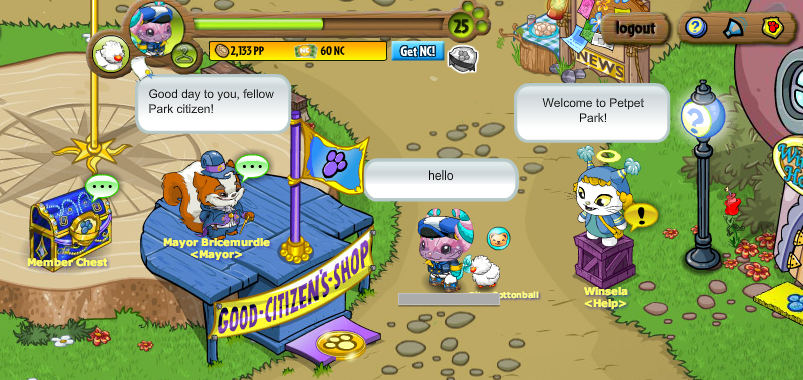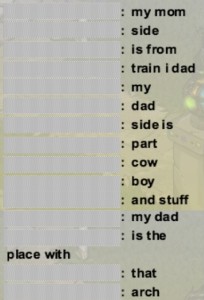The ability to interact with other players is one of the most compelling aspects of online multiplayer games. However, in games for young children, there are obvious privacy and safety concerns in allowing unrestricted chatting. The state of the art solution, implemented in practically every online community for kids is “whitelist” chat (on some websites, combined with live monitoring). Whitelist chat means that only real dictionary words are allowed (bonus: helps spelling!) and certain real words (e.g., names of place and numbers) are excluded from this list. As an enthusiast of children’s online communities, I’ve been fascinated by the many ways that children have found to get around these restriction. In this blog post, I will use the children’s online game Petpet Park as an example, though honestly it could be one of any number of communities (Roblox, Club Penguin, etc.).
In Petpet Park, children play a creature who does quests around town, plays mini games, buys clothes and toys, and decorates their own little corner of the world. The website combines a strict set of whitelist restrictions and live monitoring to ensure safe chat. However, kids always find a way!

A screenshot from Petpet Park. Children create creatures that can do quests, play games, and chat with each other.

Creative combination of real words and referring to cultural landmarks as a way of conveying real locations — a taboo topic on children’s websites.
Consider the public chat to the right (username removed for privacy). This person has found a creative way of combining real words (“train i dad” = Trinidad) and references to cultural landmarks (“cowboys” = USA, “place with that arch” = St. Louis) to discuss places of residence (a taboo topic on a children’s website). I want to be clear that I am not criticizing Petpet Park. In fact, I was impressed that this discussion was almost immediately shut down by a live monitor (booting the over-sharing child off the server), but this behavior is quite common and the damage could be done before a monitor steps in. Here are some common ways that I’ve seen children getting around the rules:
- Typing a single letter on each chat line to spell out a forbidden word. (Not possible on all websites — Petpet Park does not allow this, for example)
- Using the letter “i” to convey numbers. (e.g., “I am i i i i i i i years old”)
- Spelling out a non-whitelisted word using first letters of allowed words. (e.g., “Read only first letters. My name is Like Amazing Nutty Almonds.”)
- Using the meanings of allowed words to convey forbidden information. (e.g., “I go to the school that’s named after the guy that flew the kite.”)
The point that I want to make is that no online community is going to be 100% safe. In particular, the state of the art whitelist strategy is only effective when augmented with live monitoring (and even then, it may be too little too late). Safe chat is not a replacement for parental engagement and keeping open lines of communication about online rules. The other thing to remember is that no online filter will ever be able to enforce empathy and kind interaction online or be able to protect the child from being excluded or hurt by others. Both conversations should be an important part of raising digital citizens.
